Politics
03 January 2019 - “Montenegro continued to ensure a good level of cooperation with the European Court of Human Rights in Strasburg, but improvements are still needed regarding the application of the Court standards in daily practices,” said the EU Ambassador in Montenegro Aivo Orav at the regional conference "The obligation to execute decisions of the European Court of Human Rights", organised by the European Union and the Council of Europe in Podgorica.
"The government continues to conclude friendly settlements in cases related to the length of the proceedings and non-enforcement of domestic decisions. The overall awareness of institutions and the judiciary of the rights protected by the European Convention on Human Rights are increasing. However, improvements are still needed regarding the application of the Court standards in daily practices. Ineffective investigations do not only undermine the effective and the independent rule of law system, but they also endanger people’s lives,” emphasised Ambassador Orav.
Montenegrin officials are proud of the results of Montenegro in this area. Minister of Justice Mr. Zoran Pažin said that Montenegro, the leader among European countries when it comes to the implementation of verdicts of the European Courts for Human Rights.
"Montenegro can be a good example for other member states of the Council of Europe. We should continue with that approach, but we must be aware that the most important thing is the development of national institutions for the protection of human rights and freedom," Minister Pažin said.
Valentina Pavličić, Representative of Montenegro before the European Court for Human Rights, reminded that the implementation of verdicts of the Court in Strasburg is under the supervision of the Committee of Ministers of Council of Europe. Beside diplomatic pressure, this body does not have other effective measures to oblige member states to implement verdicts.
“Because of that, democratic maturity of a country is reflected in its willingness to fulfil the obligations defined by the Convention, regardless of aggravating circumstances. As a representative in charge of implementation of European Court verdicts, I can say that the success in that matter depends to a great extent on the willingness of state institutions to proceed with their obligations in this area. The experience of Montenegro is very positive, and we have reasons to be proud,” said Pavličić.
According to the number of applications before the European Court of Human Rights about the number of inhabitants, Montenegro was among the first five countries last year. According to the Council of Europe’s data, the citizens of Montenegro mostly complained about the violation of the right to trial within a reasonable time, as is the case with applications from most European countries.
Copyrights: Press and information team of the Delegation of the EU to Montenegro
February 3, 2019 - A protest of unsatisfied citizens was held on Saturday in Podgorica, which gathered around one thousand participants. The cause of the gathering is the legal, social and political scandal known as the "Koverta" (Envelope) affair, as well as the numerous criminal offenses where the public receives written evidence, audio, and video, from sources close to the top of government. Citizens have organized a protest because the state in this and similar situations does not react as required by the Constitution and the laws of the state of Montenegro.
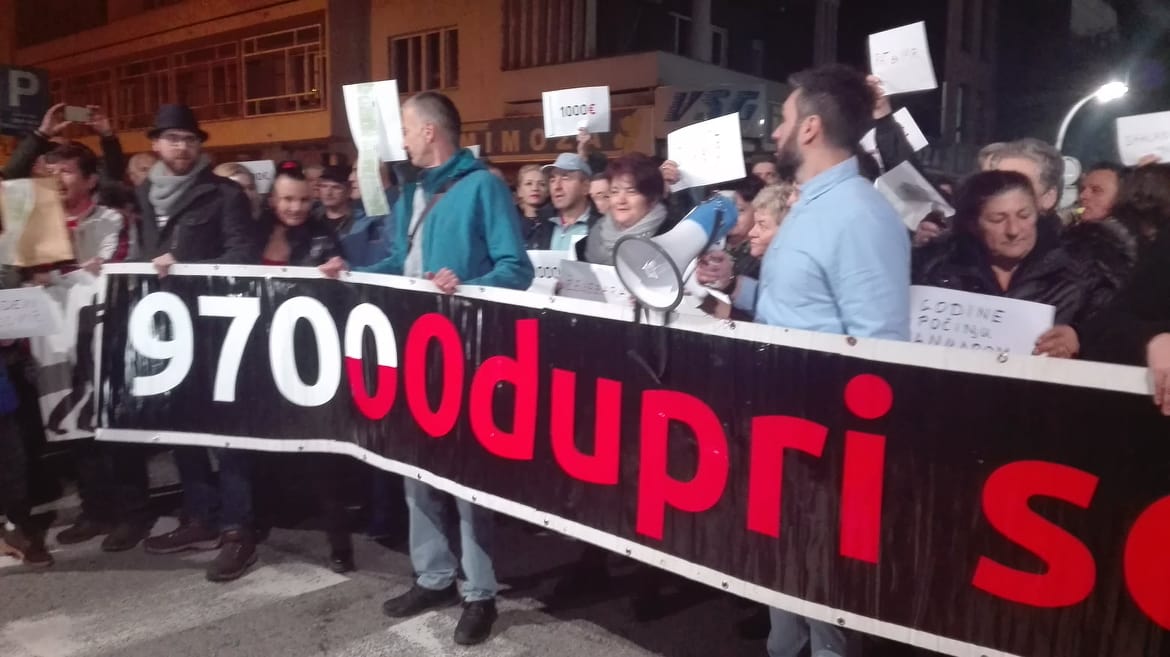 1000 Euros Envelopes- the symbolism is clear, Photo by Antonela Stjepcevic
1000 Euros Envelopes- the symbolism is clear, Photo by Antonela Stjepcevic 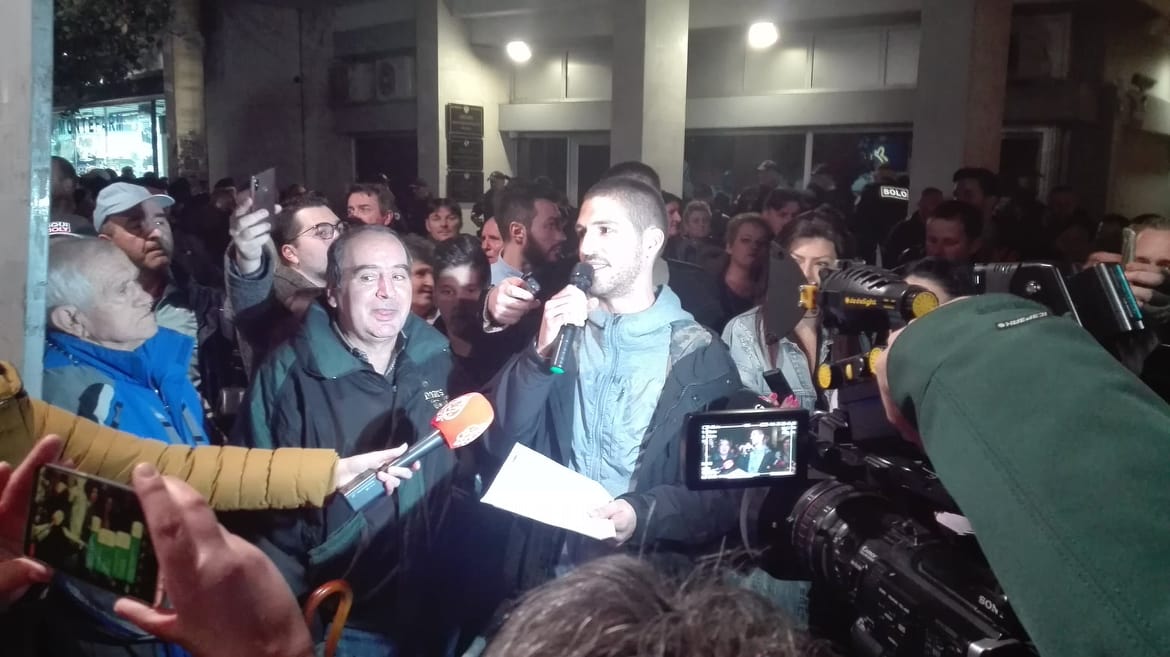 In front of organizers- Jovan Gajevic, Photo by Antonela Stjepcevic
In front of organizers- Jovan Gajevic, Photo by Antonela Stjepcevic 02 February 2019 - Prime Minister Duško Marković hosted former Presidents and Prime Ministers of the countries of our region gathered in the newly formed Podgorica Club and expressed the full support of the Government, to the work of this entity and its further activities to promote the region's prospects, its European integration, and to affirm the policy of good neighborly relations and cooperation.
"The Podgorica Club project is a good project, needed by our region and as an idea and as a vision that can further bring us together and encourage us," Prime Minister stressed. He assessed that it's logical to name the initiative by the capital of our country, which has passed through the process of achieving strategic priorities in the past two decades while preserving good relations with everyone.
"In that matter, Montenegro had serious challenges, but it did not lose a single friend and gained a lot of new ones," Duško Marković noted. The Prime Minister thanked the members of the Podgorica Club for the assistance they provided as the highest state officials to Montenegro during the process of restoring independence, and our European and Euro-Atlantic integrations.
"I see your experience and this format as a potential for gathering people in our region who will seriously think about our common future," Prime Minister Marković said.
Members of the Podgorica Club presented the Prime Minister a program of future work on creating a new narrative and a new vision of our region, stressing that as members of the Club outside of the daily politics, and from this position, they see the possibility of action in the areas of promoting economic, scientific and other cooperation.
Former President of Montenegro Filip Vujanović, former President of the Republic of Macedonia Branko Crvenkovski, the Republic of Slovenia Danilo Tirk, the former Prime Ministers of the Republic of Serbia Mirko Cvetković and the Republic of Croatia Jadranka Kosor and former Chairman of the Council of Ministers of Bosnia and Herzegovina Zlatko Lagumdžija spoke with the Prime Minister Duško Marković.
The Prime Minister was informed that the Podgorica Club is also composed of former Presidents of the Republic of Slovenia Milan Kučan, the Republic of Croatia Stjepan Mesić and the Republic of Kosovo Fatmir Sejdiu, former Prime Minister of the Republic of Macedonia Hari Kostov and former President of the National Assembly of the Republic of Serbia Nataša Mićić.
01 February 2019 - Minister of Foreign Affairs of Montenegro Srđan Darmanović took part in an informal meeting of foreign ministers in Bucharest, at the invitation of High Representative for Foreign and Security Policy Federica Mogherini and Minister of Foreign Affairs of Romania Teodor Melescanu.
Minister Darmanović congratulated Romania on the first presidency over the Council of the European Union and welcomed the defined priorities of its six-month programme. He also expressed his satisfaction with the fact that the policy of enlargement was high on the agenda of the presidency, hopeful that the integration process, based on the principle of regatta, significantly stimulated the reform of our societies and further economic development of the region, while strengthening the security, peace, and competitiveness of Europe.
The Montenegrin Foreign Minister said he expects that the remaining negotiation chapter 8 (Competitiveness) will be opened during this year, as well as that Montenegro will meet the provisional benchmarks in chapters 23 and 24. He also reiterated the full commitment of the Montenegrin institutions to achieving internal readiness to close a set of chapters.
The meeting in Bucharest exchanged views on cooperation with China, focusing on issues of relevance to the EU and candidate countries.
The informal meeting, attended by foreign ministers of European Union candidate countries and Turkey, as well as representatives of the European Commission, was an opportunity to consider other current issues and challenges within the Union.
During her last visit to Montenegro, the Prime Minister of Romania, Vasilica Viorica Dăncilă, said that she had very constructive discussions with Prime Minister Marković and emphasised that in the future, the two countries will pay more attention to sectoral cooperation and cooperation in the field of energy, education, culture, and tourism, as well as cooperation in the field of investments.
"We decided to organise an economic forum together to present one of the first steps in promoting cooperation between the two countries," Romanian Prime Minister Vasilica Viorica Dăncilă concluded.
01 February 2019 - The environmental organisation NGO Ozon called on the local governments of Nikšić and Danilovgrad Municipalities and the Podgorica Capital to join the government in the process of legal protection of the Zeta River area.
"We believe that, in accordance with great importance of the Zeta River with its tributaries and hydrological phenomena, the specifics of its upper and lower flow and territorial jurisdiction of local administrations, we need a strategic recognition of the importance of this river for the further development of local communities, but also of the potential for the national branding of Montenegro as an ecological state, i.e. the entire social prosperity," the statement said.
NGO Ozon proposes that three municipalities adopt a joint Resolution for the protection of the Zeta River, in order to allow the public to be involved in this initiative, and that the Government of Montenegro, through the competent institutions, the Ministry of Sustainable Development and Tourism, The Nature Protection Agency and the Environment Agency open a public debate in order to examine all the relevant facts through the argumentative discussion. Keeping in mind the fact that the significance of the Zeta River in the aspect of an ecosystem is already recognized in national and local strategic documents, the representatives of this movement believe that the protection of this river at the international level is also important in the context of European integration and the success of the negotiations in Chapter 27. This step, they conclude, is another tool for the joint resolution of the local government administrations which should take part in this initiative.
The representatives of the Environmental Movement NGO Ozon announced that it will begin with the action of collecting citizen support for the protection of the Zeta River, and announced the implementation of this initiative on a series of thematic events, "in order to create an incentive environment for public argumentative discussion and active citizen participation in the decision making process, "the statement said. They also invited all interested parties to support this civic initiative.
The NGO Ozon was founded with a mission to contribute to improving the quality of life and the environment, as well as protecting the public interest through active participation in the decision-making process, public advocacy, and education of various target groups from all segments of the society.
30 January 2019 - Montenegro can serve as an example to many other members of the Council of Europe when it comes to the execution of judgments of the European Court of Human Rights, said Deputy Prime Minister Zoran Pažin at the opening of the regional conference "Duty to Execute Decisions of the European Court of Human Rights" in Podgorica.
"As Deputy Prime Minister and Minister of Justice, I am very proud of Montenegro being the front-runner of European countries in the timely, conscientious and orderly execution of the judgments of the European Court of Human Rights," said DPM Pažin.
The Deputy Prime Minister stressed that Montenegro should continue with such a good and responsible attitude towards the judgments of the European Court of Human Rights, adding, "But we should be aware that the most important is development and strengthening of national institutions for the protection of human rights and freedoms, because national institutions should carry the fundamental burden, and the protection of human rights should be primarily achieved at the national level."
He pointed out that no judgment of the European Court of Human Rights establishing a violation of any of the Convention rights is at the expense of Montenegro. "On the contrary, they give us guidelines in which direction the Montenegrin legal order should be developed, in which way we should promote and strengthen human rights and freedoms for the benefit of our citizens."
Speaking of the importance of the European Convention on Human Rights, the Deputy Prime Minister estimated that it was the most sophisticated international legal instrument for the protection of human rights and freedoms.
"The citizen becomes the subject of international law, in a procedural sense equal to the most powerful of the states and the richest of governments. No other international legal instrument has made such a strong promotion of human rights and freedoms as the European Convention," concluded Pažin.
29 January 2019 - The area of Ulcinj Salina should be declared a protected area by the end of February, said the executive director of the Montenegrin Centre for the Protection and Study of Birds, Jovana Janjušević, in an interview for TVCG, adding that the real and serious job has only started.
The European Integration Office has recently published the Common Position of the European Union for Chapter 27 - Environment and Climate Change, which represents the initial and most important document for planning the obligations that need to be fulfilled within this area in the upcoming period. This document states that without the adequate protection of the Ulcinj Salina area, Montenegro cannot count on the temporary closure of Chapter 27.

The Common Position of the European Union for Chapter 27 explains that “the EU invites Montenegro to demonstrate its capacity to manage the Natura 2000 network by ensuring effective management of existing national protected areas, by affording the Ulcinj Salina the appropriate protection status and effectively implementing the necessary conservation measures leading to the improvement of its conservation status and by designating marine protected areas and ensuring their effective management.”
Ulcinj Salina is located in the outermost southern part of Montenegro and covers approximately 14.5 km2 of salt basins. The Salina is separated from the sea by the Brijeg od mora village and Velika plaža beach, and from the Bojana River by channels and dykes against floods. It is an integral part of the Lake Skadar and Bojana River watershed system.

Janjušević told the Mina News Agency that this is by far the highest level of support for the EU civil sector in the matter of the protection of Ulcinj Salina. "Until now, no country that negotiated with EU has ever had the protection of a particular site set as a condition for closing negotiations, which speaks primarily about the importance of Ulcinj Salina in terms of nature protection, but also about the specifics that it carries as a complex problem for the whole of Europe," Janjušević said. "We have just met a formal legal protection requirement, but effective management and responsible steering remain as difficult challenges in the coming period," Janjušević concluded.
She pointed out that Salina is an artificial ecosystem based on and suited for the industrial activity of salt production, and that its production has been carried out in accordance with the rules of the International Union for the Conservation of Nature.
The first act on the protection of the Ulcinj Salina was adopted in 1984 when the decision of the Workers Council banned all hunting. Several years later, the Ulcinj Salina became the first Important Bird Area (IBA) in Montenegro and afterwards became an Emerald site under the Bern Convention.
In the final study on protection of the Ulcinj Salina, according to Janjušević, two options were proposed: if the Salina will continue the salt production – the site will be protected as a national park, and if there will be no salt production, the area will be protected as a nature reserve.
29 January 2019 - At the latest session, the Government of Montenegro passed the Information on the conclusion of the Agreement on the transfer of credit and grant funds for the needs of implementing the project "Wastewater Collection and Treatment in Podgorica," financed from a loan arrangement signed on 22 September 2017 by the German Development Bank (KfW) and the Government of Montenegro, in the amount of 35 million EUR.
On that occasion, the Government gave its approval to the Capital City of Podgorica for loan funds provided by the arrangement with KfW Bank, and accepted the Agreement on the transfer of credit and grant funds for the needs of the project "Collection and treatment of wastewater in Podgorica." It is envisaged that the Capital City will transfer funds of a loan arrangement of 35 million EUR, of which the amount of 26 million EUR will be transferred without obligation to return, while the remaining amount of 8.05 million EUR the Capital City will be obliged to return to the State.
The total value of the project is around 50.35 million EUR and will be financed from three sources: a grant of 10.15 million EUR provided by the Investment Framework for the Western Balkans, a loan from KfW Bank for 35 million EUR and the Capital City's sources amounting to about 5.2 million EUR.
The Government also passed the Report on the Implementation of the Action Plan for the Implementation of the United Nations Security Council Resolution 1325 - Women, Peace and Security in Montenegro (2017-2018). The Action Plan elaborates three critical areas for the implementation of Resolution 1325, which deal with increasing women's participation in decision-making and peace processes, the protection of women and girls in conflict zones, and the integration of gender perspectives and gender education in peacekeeping operations, and the areas of mechanisms for its implementation and its accompanying resolution. The plan identified 9 goals and 41 activities, out of which 32 activities were realised, 4 activities were partially realised, 1 activity is in progress, while 4 activities are not realised.
The Government approved the Information on the provision of funds for covering the expenses for conducting elections for electing councilors in the Municipal Assembly of Tuzi, which will take place in March 2019. In accordance with the Law on Territorial Organisation of Montenegro and the Law on Financing Political Entities and Election Campaigns, the Government decided to provide 58.250,00 EUR for covering the expenses of the elections, as well as 2.992,00 EUR for financing the costs of the election campaign for submitters of the electoral lists in the Municipality of Tuzi.
28 January 2019 - According to the information provided by the Parliament of Montenegro, the Committee members also met the president of the Republic of Albania, Ilir Meta, Albania’s parliament speaker Gramoz Ruci, minister for diaspora Pandeli Majko as well as the members of the Committee for foreign affairs and subcommittees for diaspora and human rights.
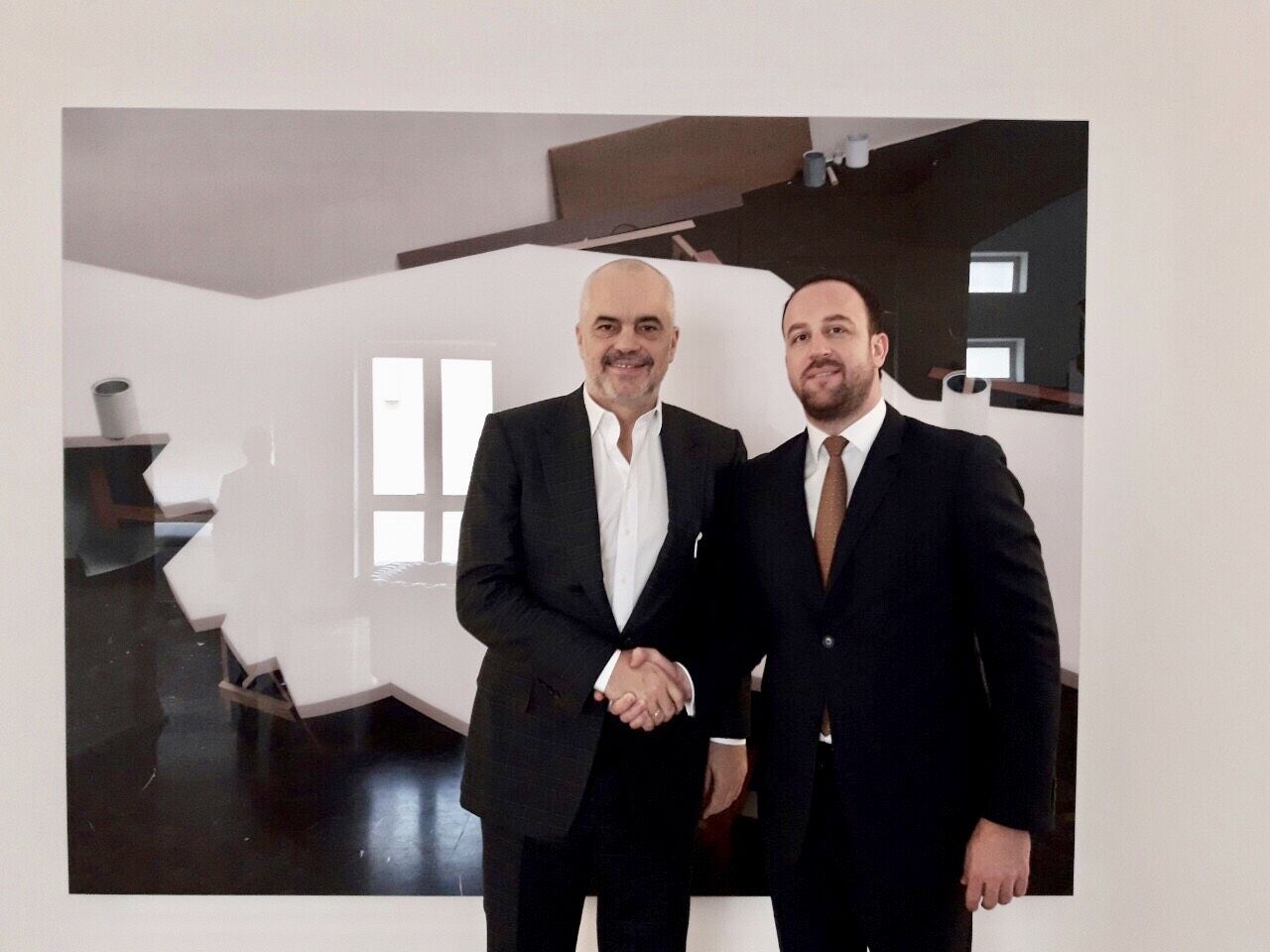
During the meetings, both sides concluded that “Montenegro and Albania have fostered their friendly relations, mutual trust, and good neighborly relations.”
Apart from Nikolić, the Montenegrin delegation included other members of the Committee as well – Luiđ Škrelja, Halil Duković, Miloš Nikolić, and Ervin Ibrahimović.
Montenegro Ambassador to Albania, Dušan Mrdović, and Montenegrin consul in the Embassy, Danilo Brajović also attended the meetings.
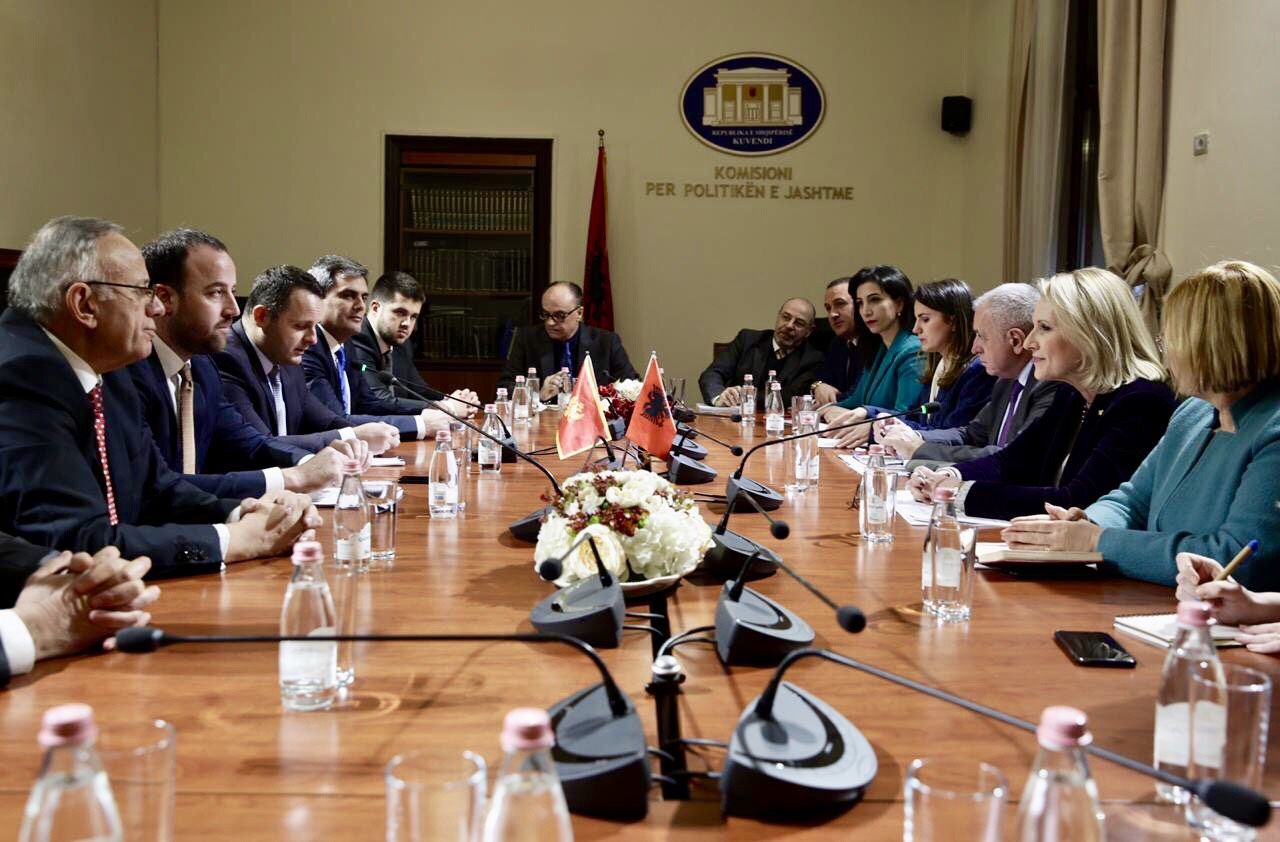
During the earlier meeting that took place in Podgorica, Prime Minister of Montenegro Duško Marković and President of Albania Ilir Meta agreed that Montenegro and Albania should join forces to make the best of standard potentials in many areas such as water management, tourism, and agriculture.
"The economic prospects of the two countries are serious, and the two governments should do everything to use them," said Prime Minister Marković, adding that bilateral political relations are at a very high level.
The meeting also discussed the importance of peace and stability in the region, and in that context, the importance of the membership of both countries in NATO, emphasising the significance of European integration as well. Prime Minister Marković said that Montenegro supports Albania's EU bid, adding that country is willing to transfer knowledge and experience from its negotiation process.
Source: Cafe del Montenegro
January 29, 2019 - After three months of peaceful protests against a controversial construction project and in defense of preserving a nearly century-old cypress park in the center of Bar, a port city on Montenegro’s coast, it looks like the battle has been lost. However, Sonja Dragović tells us that the activists are not giving up - by responding to the government’s oppressive and deceitful tactics with hopeful, creative, and sustained acts of resistance, they keep trying to reclaim their right to the city, note the editors of LeftEast introducing the article published on 26 January
The Montenegrin town of Bar, an Adriatic Sea port, suffered a major loss last Thursday morning when around 90 cypress trees, almost 100 years old, were cut down in an attempt to clear a plot of land for the construction of a new kindergarten. This regrettable action is not, as it may initially seem, the result of a lack of space for much-needed new pre-school facilities, but a direct consequence of urban planning malpractices that have had a detrimental effect on the development of the entire country. In this particular case, the lack of accountability and transparency – together with systemic discouragement of meaningful public participation – produced a disastrous result. The only possible silver lining is the newly awaken energy of civil disobedience and communal solidarity rediscovered among the citizens of Bar, who are determined to stand up for their park, their schools, and the future of their city.
The works were announced on October 15 when Bar’s mayor, joined by the Minister of Education, set the foundation stone while casually noting that the new pre-school facility will be built between the buildings of two existing schools, where the old cypress park was located. Even though this face was announced as a matter-of-fact, not-to-be-discussed-any-further, the protests began almost immediately with a group of high school students starting to shout at the politicians participating in the ceremony, expressing their readiness to oppose the works and the implied destruction of their schoolyard, of which the park is an inseparable part.
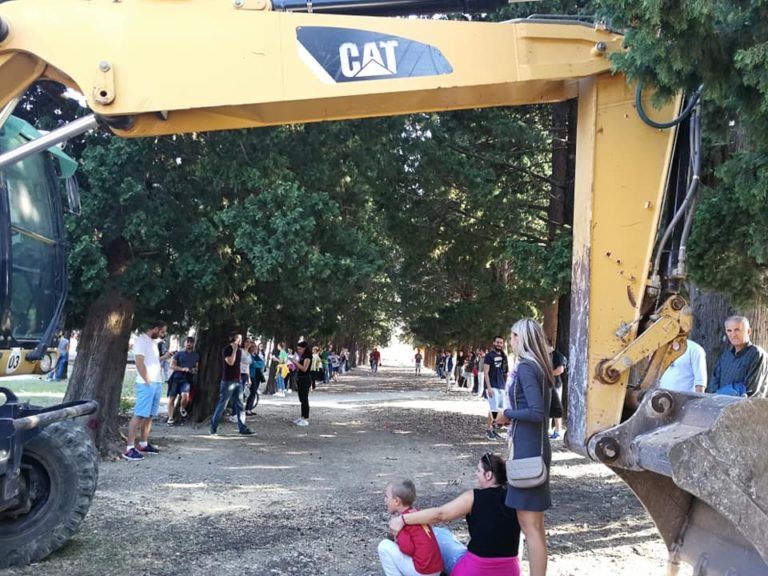 Human shields: citizens of Bar defending the cypress park. Photo: Anastasija Ivović
Human shields: citizens of Bar defending the cypress park. Photo: Anastasija Ivović
In the following days, the broader community began organizing in support of the cause. Human shields stopped the first attempt to cut the trees down, night watches were constantly organized, and a petition that asked for the park to be protected and for the new kindergarten to be moved elsewhere gathered more than 3,000 signatures. Meanwhile, students turned the protest into a festival dubbed “About Cypress Trees and People,” converting the park and the small amphitheater within its limits into a regularly occupied stage for local artists, debates, lectures, and workshops.
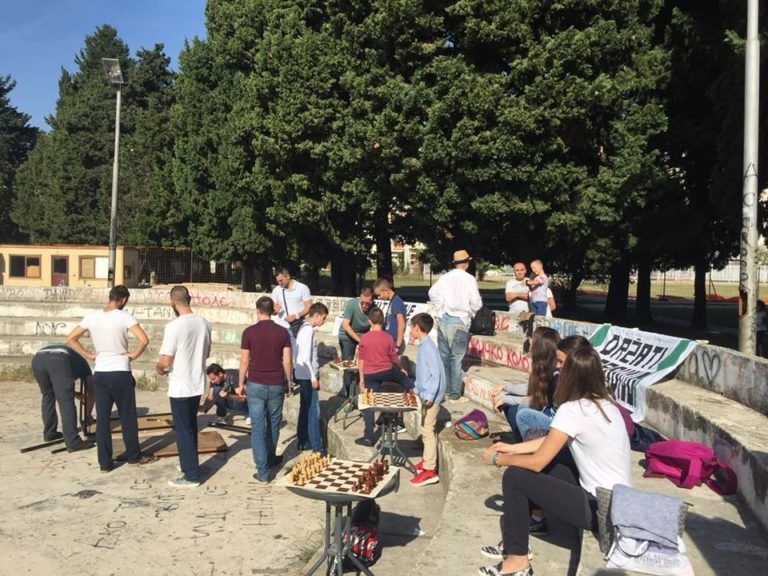 Human shields: citizens of Bar defending the cypress park. Photo: Anastasija Ivović
Human shields: citizens of Bar defending the cypress park. Photo: Anastasija Ivović
Persistence paid off, at least temporarily, and the local parliament was persuaded into stopping the works and holding a special session to discuss the issue and vote on how to proceed. On November 15, the petition was dismissed - 14 opposition members of the local parliament supported the protesters, while the ruling majority did not: 7 were against their demands, while 13 were undecided. Activists agreed to continue advocating for their cause by using other legal instruments, primarily to examine the urban planning procedures that led to this outcome.
The plan for this construction project and everything it entailed was not new – it was only not discussed in public until the works were about to begin. The detailed urban plan which placed the kindergarten in the schoolyard was adopted in 2009 by the local parliament; upon closer inspection, it seems to be flawed, full of contradictions, and outdated. The building permit was first obtained in 2014 and renewed in 2017; it was issued even though the necessary documentation seems to be incomplete and the project itself is, to put it mildly, of dubious quality. All of these shortcomings have been discovered and publicized by local activists, who have submitted a request for inspection to the planning and construction authorities and filed an appeal to the Administrative court of Montenegro.
None of this really mattered. During the winter school break, while the procedures for assessing the validity of the plans were still ongoing, early in the morning of January 17, without warning, the trees in the cypress park were cut down. Since the official construction plan didn’t even account for this greenery (which was one of the shortcomings above), the authorities didn’t provide any official information on what portion of the park was to be destroyed, or why the works couldn’t wait for the official ruling on the citizen's appeals against this decision. Construction firms hired to do the job came from other cities. When the activists tried stopping them, the local police interfered and carried the protesters out of the park. According to activist’s accounts, 91 out of 127 cypress trees were cut down.
The damage Bar suffered is irreparable. The centrally located park provided protection from the strong sea winds and erosion, representing a natural oasis for the schoolyard and was, by all accounts, a beloved local landmark. So, why did this happen? In short, because it was convenient for the government, and because the wishes, needs, and long-term interests of the citizens are not the government’s prerogative. A longer answer would have to take into account flawed spatial planning procedures, which have for decades deliberately excluded people from the decision-making processes. The usual strategies of exclusion include lack of promotion for necessary public consultations, failure to provide the required materials in time and a format accessible to the broader audience, and the deliberate withholding of important (and possibly unpopular) facts. The goal is to have the consultative procedures formally fulfilled but essentially rendered meaningless, designed to confuse the wider public and discourage citizens from getting to the bottom of the planning process. What lies at the root is, of course, private interests - turning public space and public property into lucrative business opportunities for privileged individuals.
The case of Bar is not fundamentally different, even though the building in question is a public kindergarten – not a new tower built by some controversial “strategic investor,” as is usually the case. By placing the new pre-school facility for 400 children in the existing, already crowded schoolyard mostly used by high schoolers, the local government and the Ministry of Education have violated current planning rules and prescribed construction codes. Such a decision, however, was strategic - it preserved some other piece of publicly owned land in Bar for future, money-making construction projects. In this business calculus, a public park could only ever be a nuisance, an obstacle to getting rid of it – and that’s precisely what happened, common sense and the public interest be damned. One of the many sad ironies of this episode is that the construction of the future kindergarten is funded with a credit from the Council of Europe Development Bank, an institution whose Environmental and Social Safeguards Policy clearly states its commitment to promoting good environmental practices.
Source: LeftEast, author Sonja Dragovic
The Montenegro Immigration Law, which entered into force in February 2018, was changed recently.
In January of 2019, the new amendments to the Montenegro Immigration Law were adopted. The latest edition of the Law has already entered into force. In this article, we will highlight the most important innovations.
Temporary residence permit for property owners
The procedure for issuing the real estate owners a temporary residence permit in 2018, had perhaps the most significant changes and interpretations. Finally a temporary compromise was found before the adoption of the relevant amendments to the Law. In the new version of the Law, the residence permit from the real property possession can be obtained in case if shared ownership is at least 1/2 (Article 56 of the Law).
Temporary residence for employment
There are few changes in this part.
►A fundamentally new position is included. From now it is possible to obtain a residence permit by occupying the post of executive director in several Montenegrin companies. The Labor Law governs details of such employment. For ordinary employees, not directors, nothing has changed. A residence permit can be issued only for a specific workplace with a particular employer.
►Foreigners over 67 years old will be able to get a temporary residence permit as employees: individual entrepreneur or executive director. In case of an executive director, there are some possible terms: the foreigner should be an executive director of his own company and have a share in the authorized capital of at least 51%. Previously, employment of foreigners over 67 was unavailable due to restrictions in the Labor Law.
Considering that the Immigration law gives no reason for obtaining a “pension” residence permit this amendment is more or less a mcompromise.
►Requirements for some terms have been changed.
The term for the decision-making process regarding the application for a working residence permit is reduced from 20 to 15 days. The period for signing a job contract and registration with the tax authorities is reduced from 8 days to 24 hours.
Quotas by profession are abolished, only quotas by industry remain.
Permanent residence in Montenegro
Children under the age of 14 and adults over the age of 65 are not obliged to provide a certificate confirming the local language proficiency when applying for a permanent residency.
Visa to Montenegro
An electronic application system is to be developed for obtaining a Montenegrin visa. It will be available on the websites of the Ministry for Foreign Affairs of Montenegro and its diplomatic missions. The application form is to be submitted online. Scanned documents which confirm the purpose of obtaining a visa, as well as passport and photo, are to be attached.
Considering that Montenegro has very few diplomatic missions outside the country, this measure will significantly simplify the process of submitting visa applications.






